
Republican presidential candidate U.S. Sen. Ted Cruz (R-Texas) visits Charlie's Steakhouse on January 4, 2016 in Carroll, Iowa. (Photo by Aaron P. Bernstein/Getty Images)

IOWA — From his talking points on foreign policy and guns to his grassroots push in key early states, Ted Cruz is taking his 2016 campaign straight out of Ronald Reagan’s 1980 playbook.
And though he won't get ahead of himself, the Texas senator knows that he's surging in the right place at the right time — and the numbers that he needs to prevail in the GOP primary are starting to add up.
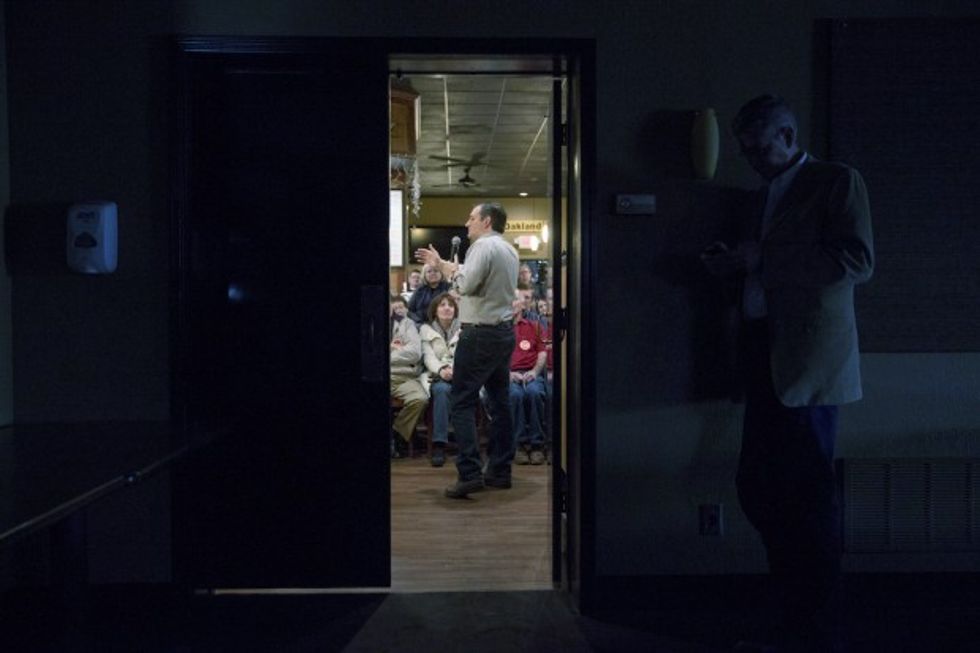
Cruz doesn’t let a speech go by without mentioning the former president, by design. Both ideologically and practically, Cruz understands that patterning himself after the beloved Republican figure is his best path to the White House.
“It took Jimmy Carter to give us Ronald Reagan,” Cruz told TheBlaze. “I believe [President] Barack Obama has set the stage for the same sort of fundamental restoration.”
Obama has been “so radical” in his seven years in office that Americans are ready to return to Reagan’s conservative values, the GOP presidential candidate said.
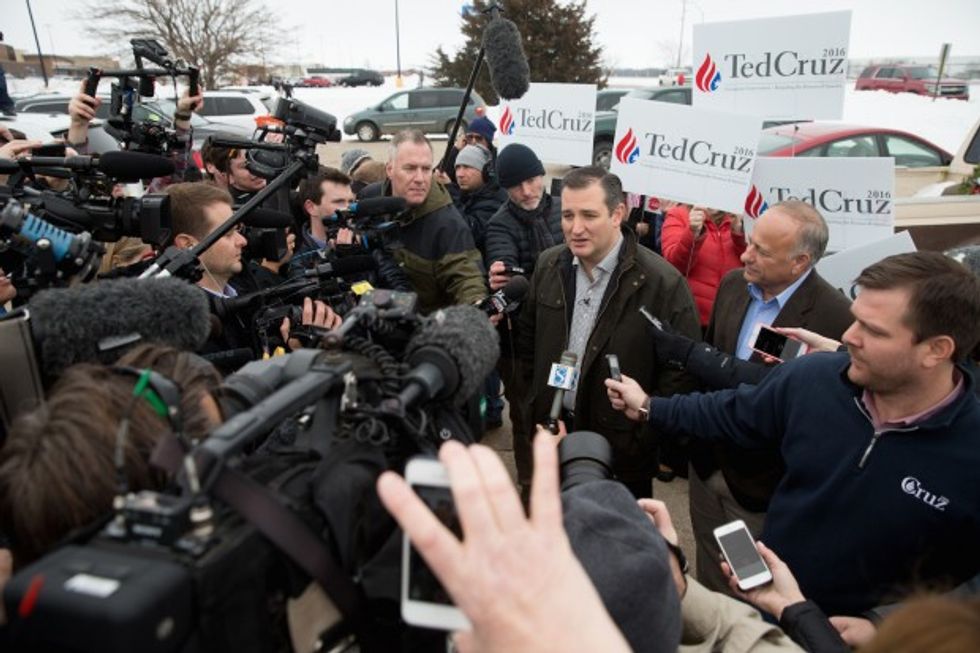
But where Reagan’s landslide victory against sitting President Jimmy Carter in 1980 was a revolution, Cruz has dubbed his 2016 campaign one of “restoration.”
The Tea Party Republican is spending the week criss-crossing the state of Iowa — where he now enjoys a lead in the polls — whipping up support town by town in-person and through volunteers in a manner reminiscent of Reagan’s ground game as well as Obama’s much-lauded 2008 grassroots effort. Cruz sat down for an interview on his campaign bus Tuesday between events at the Onawa Public Library and a restaurant in Cherokee, Iowa.
“Our approach to this campaign has been very different than many of our competitors,” Cruz said. “We resolved on day one to run a grassroots campaign, to run from the ground up.”
In his stump speech, the sitting senator tackles the notion that he can’t win due to the fact that many Washington elites “despise” him. “I kind of thought that was the whole point of the campaign,” Cruz says, drawing laughs from the crowd.
“If you look to the last instance in which we beat the Washington cartel — and that’s the term I use for career politicians in both parties who get in bed with lobbyists and special interests and grow and grow and grow government — the last time we beat the cartel was 1980,” Cruz said on his campaign bus. “Ronald Reagan understood the only way to change Washington was to go over their heads — to go where sovereignty resides, which is with ‘we the people.’ And that is exactly what we are doing in this campaign.”
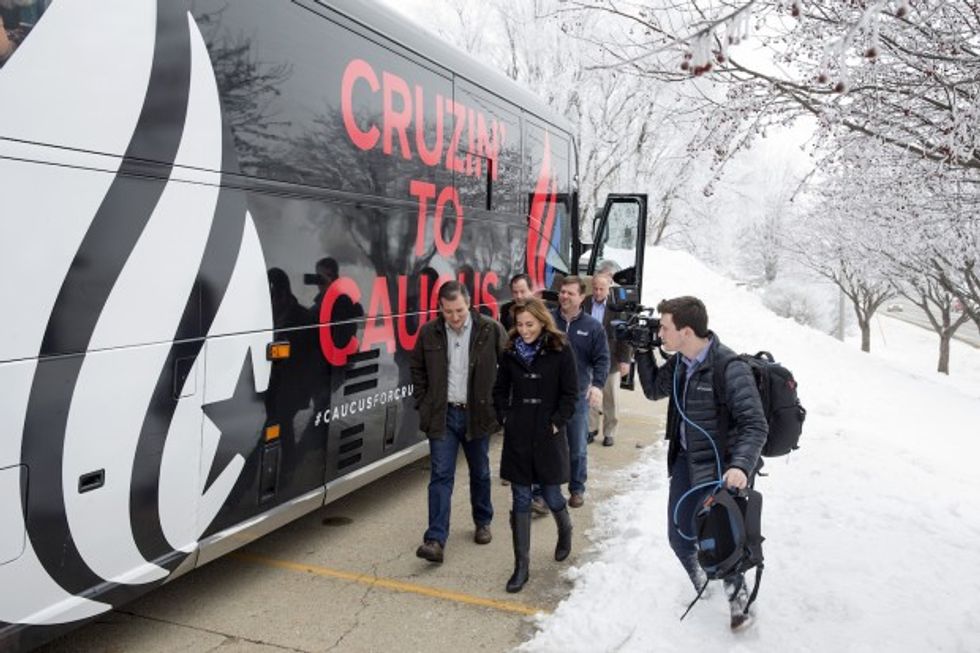
The Reagan theme is a common one among conservative campaigns — evoking the former president has been a Republican tactic for decades — but Cruz’s parallels are also practical.
How does a Republican Party with a visibly fractured congressional delegation and 12 remaining presidential contenders line up behind a single standard-bearer?
Also, a decent-sized chunk of Reagan’s support came from blue-collar Democrats. How does an unapologetic, uncompromising conservative pull Democratic voters away from a Hillary Clinton or a Bernie Sanders?
“Washington wants conservatives divided, it wants us splintered, it wants us attacking each other,” Cruz said. “That’s how in prior elections, the Washington establishment candidate runs up the middle with 23 percent of the vote, steals the nomination and then goes on to lose the general election as millions and millions of conservatives stay home.”
[sharequote align="center"]“Washington wants conservatives divided, it wants us splintered, it wants us attacking each other."[/sharequote]
Guns have been a major issue in the 2016 campaign due to the prevalence of mass shootings, fears of terror attacks on the U.S. homeland and Obama’s push Tuesday to move executively to close “loopholes” in the gun-buying process.
The first presidential candidate ever to be endorsed by the National Rifle Association was Ronald Reagan during the 1980 race. Reagan had been a strong supporter of Second Amendment right for years, writing in Guns & Ammo magazine in 1975 that “proposals to outlaw or confiscate guns are simply unrealistic panacea.”
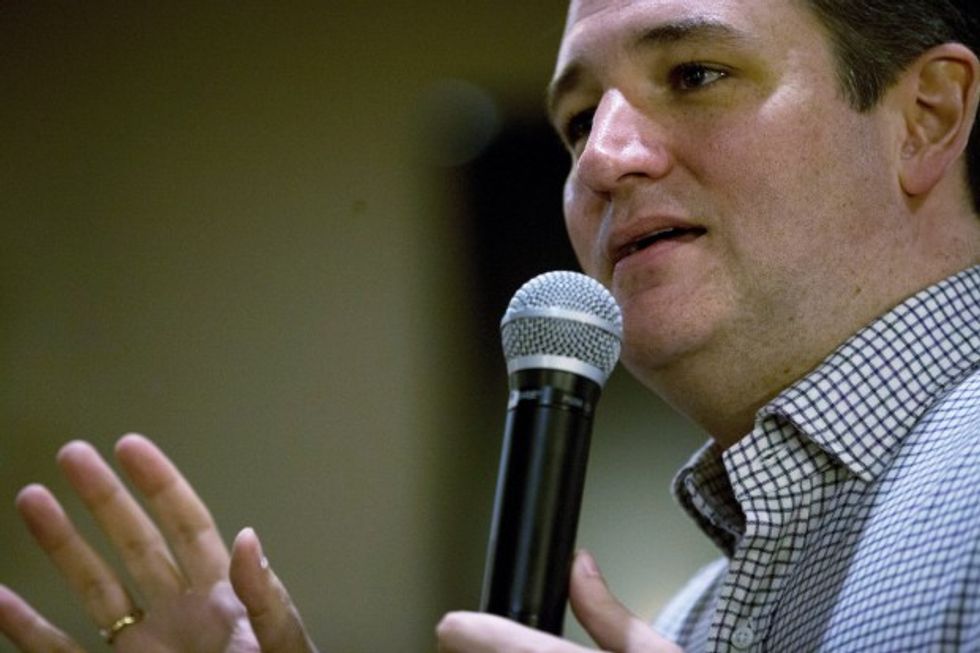
Cruz has made the gun issue one of the top ones on his campaign: He lists undoing Obama’s “illegal and unconstitutional” executive actions, including on guns, as a priority on his first day in office.
On the bus, Cruz argued that Democrats are taking the wrong approach to gun control by restricting the rights of law-abiding citizens instead of criminals. And that mentality mirrors Obama’s strategy when it comes to foreign policy, Cruz added.
“The approach on guns at home is the precise parallel to President Obama’s approach abroad — where he refuses even to say ‘radical Islamic terrorism,’ much less focus our military efforts on defeating our enemy,” Cruz said. “We need a president with a clear-eyed focus on protecting America first, and that’s exactly what I will do.”
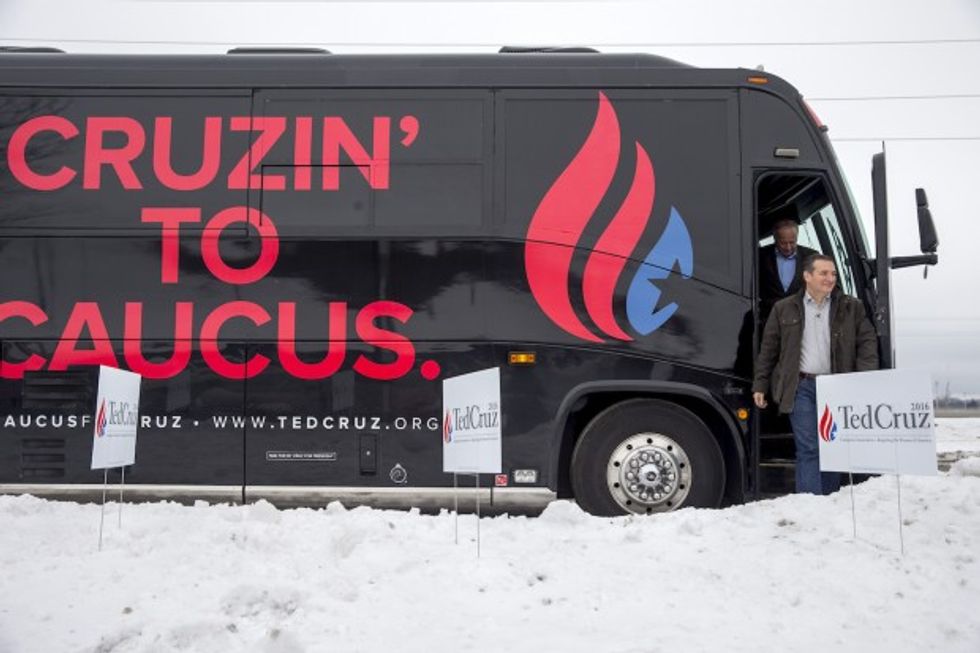
Cruz laughed off criticisms that his own foreign policy strategy is too isolationist, or America-focused. Instead, he argued that Obama’s “military adventurism” stemmed from the progressive ideal that American can and should intervene in every civil war across the globe.
“I believe in peace through strength. … If we defend our nation, both our friends and our enemies behave accordingly,” Cruz said.
The candidate has said that the U.S. should no longer accept refugees from war-torn Syria over concerns that Islamic State terrorists could be embedded with the refugees and launch attacks on the U.S. homeland.
“The talking point … is that anyone who focuses on American interests is somehow an isolationist,” Cruz said. “It is a question of focus — the focus of the commander in chief should be keeping this country safe.”
However, Cruz acknowledges that no world leader can fully guard their people against terror attacks, whether conceived abroad or homegrown.
“There will always be evil in the world, and no president can wave a magic wand and make it go away,” he said. “[But] who has the experience and judgment to confront those threats and to defeat them, and who has the strength of resolve to carry through to victory?”
Iran released its American hostages “the day Ronald Reagan was sworn in,” Cruz said.
“That’s the difference a strong commander-in-chief can make, but at the same time, in eight years the biggest country Ronald Reagan ever invaded was Grenada,” he added. “When you follow a policy of peace through strength, more often than not you don’t actually have to employ military force, because your enemies understand you’re not bluffing.”
Practically, Cruz recognizes that his path to the White House will be paved by evangelicals.
The son of a pastor, his campaign events at moments take on a sermon-like vibe — he almost growls when he talks about the “spirit of revival” that is sweeping the nation, presumably a reference to his own support levels rather than a spiritual awakening.
“I’m a numbers guy,” he explained. “If you compare 2004, the last race we won, to 2008 and 2012, by far the biggest difference is the millions of conservatives who showed up in 2004 who stayed home in 2008 and stayed home in even bigger numbers in 2012. They fall mainly into two categories: Evangelical Christians – in 2012, 54 million evangelical Christians stayed home, a majority of evangelical Christians did not vote — and Reagan Democrats.”
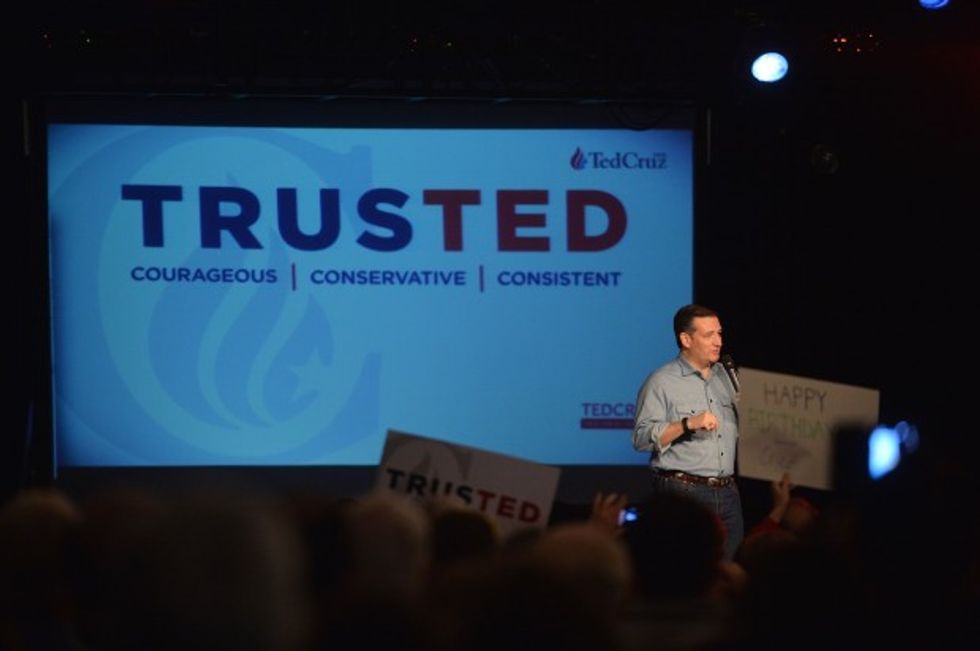
The central question to winning 2016 is how to bring those voters back to the polls, Cruz said, and he argued that electing another moderate nominee isn’t the way to do it.
“What is abundantly clear is that if we nominate another candidate in the mold of a Bob Dole, or a John McCain or a Mitt Romney … the same millions of conservatives that stayed home in 2008 and 2012 will stay home in 2016,” he said, “and Hillary Clinton becomes the next president.”
Cruz referenced Reagan’s call to the Republican party in 1975 to not “try to be all things to all people,” but instead win back the voters who stayed home in the last election because they couldn’t see the difference between the two parties.
“I believe 2016 will be an election like 1980, that we will win by following Reagan’s admonition: By painting in bold colors, and not pale pastels.”
[sharequote align="center"]“I believe 2016 will be an election like 1980, that we will win by following Reagan’s admonition."[/sharequote]
But the Reagan revolution metaphor doesn’t account for Donald Trump.
Reagan faced a field of nine other Republicans in the 1980 primary, including George H.W. Bush, but led the whole way. This time, Trump jumped out ahead of the rest of the field, and still enjoys a 15.3-point lead nationally, according to Real Clear Politics.
Cruz has started to edge Trump out in some early states, but there’s still a lot of ground to make up.
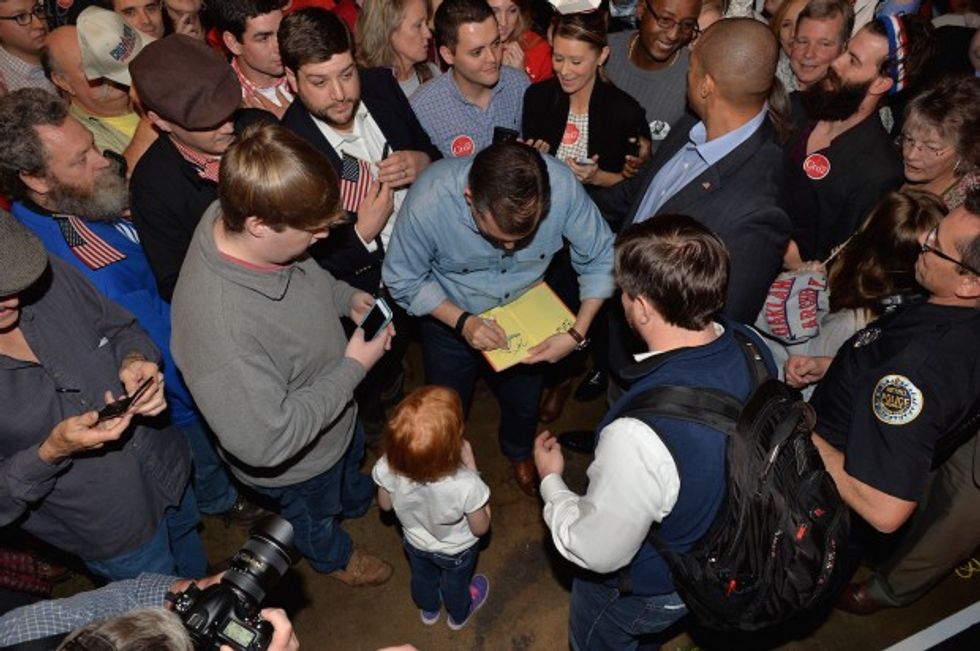
National spokesman Rick Tyler argued that Cruz’s ground game is the best of the bunch — and he pointed to internal polling, which found in early summer that 4 percent of Trump supporters would pick Cruz as their second-choice candidate.
Now, that number is nearly 60 percent, he said.
The Iowa caucuses will be held Feb. 1. A groundswell of conservative support — “there aren’t a lot of people testing the waters at a Ted Cruz event” — and recent key endorsements are all signs of necessary momentum at the right time, Tyler said: “A movement picks its own leaders, and it looks like it’s picked Ted Cruz.”
At least in Iowa, Cruz’s message is resonating. He has a 3.6 percentage point lead in statewide polls according to RCP and each campaign stop so far on the bus tour has been well-attended.
“I’m calling this the Ted Cruz shoehorn tour — pack ‘em in as tight as you can get ‘em,” said Erik Larsen, a field representative with the Pro-Cruz Keep the Promise PAC who’s been shadowing the 28-stop “Cruzin’ to Caucus” bus tour.
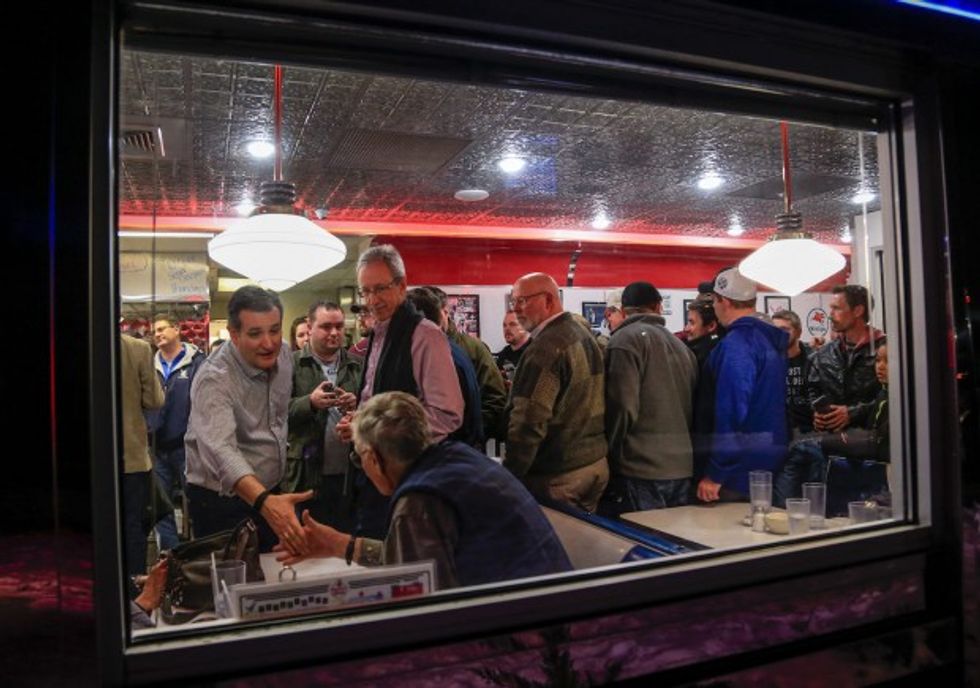
At nearly 11 p.m. Monday in Missouri Valley — population 2,838 — more than 200 people packed 60-seat Penny’s Diner to watch Cruz pour a couple cups of coffee and give a short speech.
“[The Reagan revolution] didn’t come from Washington: Washington despised Ronald Reagan,” he told attendees at the late-night event. “It came from the American people and it turned this country around.”
“Why am I so optimistic? Because the same thing is happening again,” said Cruz, picking up rhetorical steam. “All across Iowa, all across this country, people are waking up. Why am I so optimistic? Because it’s 10:30 at night in a diner and it’s standing room only.”
An onlooker stuck just inside the diner door, which kept opening and letting in bursts of 20-degree air, said: “I was here a month ago when [Mike] Huckabee was here, there were like eight people in the place.”
—
Follow the author of this story on Twitter and Facebook:
[facebook //www.facebook.com/plugins/like.php?href=